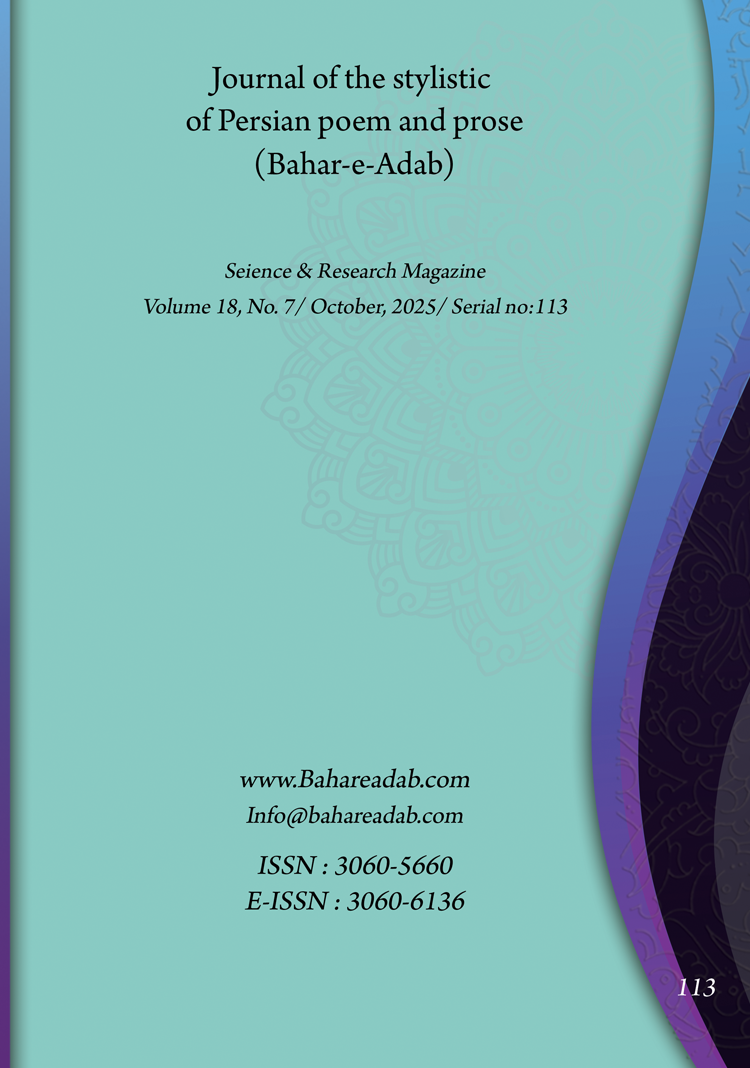- Count View : 231
- آدرس کوتاه شده مقاله: https://bahareadab.com/article_id/1880
- کد DOI مقاله: DOI:10.22034/bahareadab.2025 .18 .7882
Journal of the stylistic of Persian poem and prose
volume Number 18،
number In Volume 7،
،
issue Number 113
A Study of Post-Imitation Syntactic Deviance Techniques in the Poetry of Prominent Poets of the Seventies
Amir Salajqeh , Mansour Nikpanah (Author in Charge), Mostafa Salari
Abstract
BACKGROUND AND OBJECTIVES: The poetic developments in Iran, according to the requirements of time and place, have created innovations in literature that have freed this art from repetitiveness and lethargy. In the contemporary era, these developments have decreased from century to decade, and we are witnessing a variety of literary styles and waves in poetry. One of these active literary decades in Iran is the 1970s. New poetry after Nima faces innovations and tendencies, each of which claims to have recorded poetry with new characteristics. The 1970s is a period when various poets try to invent new innovations in the Nima style. In this regard, we have considered the poems of Babachahi, Ahmadi, Salehi, Royaei, and Abdolmalekian.
METHODOLOGY: The research method in this study was descriptive-analytical, and we compiled the materials using the library study method.
FINDINGS: The researchers considered five indicators to review and analyze selected poems of the poets in terms of syntactic deviation. The results of the analysis of these poems showed that Babachahi has a higher score than his contemporaries in terms of syntactic deviation parameters.
CONCLUSION: By examining the poetry of these poets in the five indicators considered, Babachahi"s distance from his contemporaries is significant and impressive in the elimination of the elements. In the displacement of the elements, all five poets move close to each other. In the use of the object pronoun, Babachahi is at the top of the chart. In incomplete sentences, we witness a significant distance between Babachahi and his contemporaries. In the repetition and contrast section, Babachahi is still at the top of the parameter considered.
Keyword
Syntactic non-normativity
, poetry of the seventies
, Babachahi
, Yeda...Royaei.
- Ahmadi, Ahmad Reza (2008) All My Poems, Tehran, Cheshme.
- Ahmadi, Ahmad Reza (2018) Summer Poetry Collection of Sorrow, Tehran: Cheshme.
- Ahmadi, Babak (2006) Structure and Interpretation of the Text, Tehran: Markaz Publication.
- Babachahi, Ali (2009) Picasso in the Waters of the Persian Gulf, Tehran: Sales.
- Babachahi, Ali (2011) A Thousand-Day Rain of Flowers, Tehran: Morvarid.
- Babachahi, Ali (2011) Drizzle, Second Edition, Tehran: Cheshme.
- Babachahi, Ali (2013) In the Caves Full of Leaves, Tehran: Negah.
- Babachahi, Ali (2013) A Ship of Secrets, Tehran: Negah.
- Royaei, Yadollah (1978), From the Red Platform, Tehran: Morvarid.
- Royaei, Yadollah (1938), Collection of Poems, Tehran: Negah.
- Shafiei Kadkani, Mohammad Reza (2006) Poetry Music, Tehran: Agah
- Shafiei Kadkani, Mohammad Reza (2012) Resurrection of Words, Volume One, Tehran: Sokhan.
- Shams Langroodi, Mohammad (1992) Analytical History of Modern Poetry, Tehran: Markaz.
- Salehi, Seyed Ali (2003) Poetry in Every Condition, Tehran: Negima.
- Salehi, Seyed Ali (2008) Collection of Works, Second Book of Poetry, Third Edition, Tehran: Negah.
- Salehi, Seyed Ali (2009), We Should Not Die, Dreams Become Motherless, Tehran: Negah.
- Salehi, Seyed Ali (2010) Anis Akher Hemni Haftan Aide, Tehran, Negah, Volume One, Tehran: Cheshme.
- Safavi, Kourosh (1994) From Linguistics to Literature.
- Abdolmalkian, Gross (2008) Lines in the Dark It changes places, Tehran: Morvarid.
- Abdolmalekian, Gross (2014) Acceptance, Tehran: Cheshme.
- Abdolmalekian, Gross (2016) The colors of the world that have passed away, Tehran: Cheshme.
- Abdolmalekian, Gross (2018) The Middle East Trilogy, fourteenth edition, Tehran: Cheshme.
- Abdolmalekian, Gross (2014) Nothing is as fresh as death, fifteenth edition, Tehran: Cheshme.
- Alipour Mostafa (2010) The structure of the language of poetry today, Tehran: Ferdowsi.
- Lotij, Mohammad (2014) Seventy Yellow Flowers, Tehran, Land of Ahuraei.
- Mohabbati, Mohammadi (2001) New Novel, Tehran: Sokhan.
- Mozaffari, Solmaz (2013) The use of non-normativeness in the grammar of love, Roshd Quarterly, Persian Language and Literature Education, Number 044.
- Vashghani Farahani, Ebrahim (2008) The Origin of Poetry and Some Poetic Symbols, Website Onroozha.

